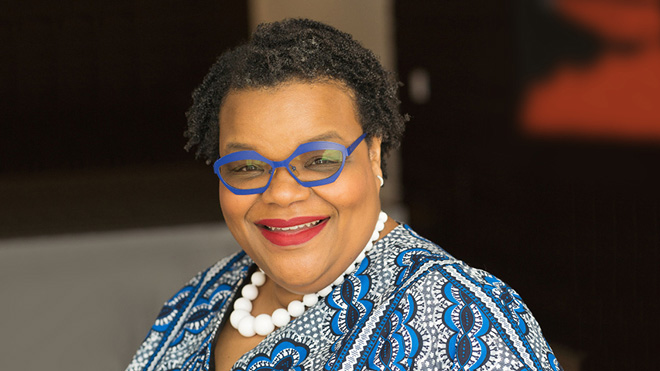
12 Black Finance Leaders in History
Celebrate legendary Black trailblazers who overcame adversity to achieve success and shape the history of finance in the United States.
Throughout U.S. history, Black Americans have faced monumental barriers to financial health and success — barriers that include a history of slavery, segregation, racial violence and racist policies and systems.
These conditions left a legacy of inequity that persist to this day. On average, Black families own about 23 cents for every $1 of wealth owned by white families, according to the Institute for Economic Equity.
In the finance industry, achieving success has been not just daunting but in many cases, completely inaccessible to Black participation.
In 1711, Wall Street became the official site of New York City's slave market before becoming the location of the New York Stock Exchange in 1792. It would be 178 more years before Joseph L. Searle III became the first Black person to become a member of the NYSE.
Despite these oppressive forces and systems, Black leaders throughout history have overcome adversity to achieve success and blaze the trail for others.
We hope these stories of Black financial leaders in history inspire you on your own financial path, business aspirations and pursuit of racial equity.
Maggie Lena Walker
Maggie Lena Walker was the first Black woman to establish and serve as president of a bank in the United States. Walker found that white-owned banks didn't typically take deposits from Black organizations, so, in 1903, she started her own bank, St. Luke Penny Savings Bank, in Richmond, Virgina., with money gathered from members of the Independent Order of St. Luke, an African American benevolent society. It was renamed Consolidated Bank & Trust after merging with two smaller Black-owned banks in 1930. Walker also chaired the board of directors. The bank was still in operation and was the oldest continuously operated African American-owned bank in the U.S. until 2005, when a series of ownership changes led to Peoples Bancorp acquiring the bank in 2021.
Norman McGhee Sr.
In 1952, Norman McGhee Sr. founded McGhee & Co., the first Black-owned brokerage firm in the U.S. and became the first African American licensed stock dealer in the Midwest.
Based in Cleveland, Ohio, McGhee and his firm aimed to open doors for the Black community to build wealth and achieve economic advancement through stock investment.
McGhee also leveraged his wealth and influence to support civil rights causes and was an active member of the NAACP, now the nation's oldest civil rights organization.
O.W. Gurley
O.W. Gurley moved to Tulsa, Oklahoma, in 1906, where he purchased 40 acres of land on what would become Greenwood, a community known as Black Wall Street. Gurley ran many businesses of his own and supported other entrepreneurs in their business endeavors. Greenwood became a thriving center that included law offices, medical practices, luxury shops, restaurants, movie theaters, barbershops and salons. It had its own school system, post office, bank and bus service. Michelle Place, executive director of the Tulsa Historical Society and Museum, told History.com, "It is said within Greenwood every dollar would change hands 19 times before it left the community." The town was devastated in 1921 during the 18-hour Tulsa Race Massacre, also known as the Tulsa Race Riot, when a white mob committed what is still one of the worst acts of racial violence in U.S. History.
Ernesta Procope
In 1953, Ernesta Procope founded the E.G. Bowman insurance company in Brooklyn, N.Y. In 1979, she moved the business making it the first Black-owned business on Wall Street. It grew to become the largest minority-owned insurance company in the U.S. Procope became a powerful voice for insurance reform to ensure fair coverage for low-income families. E.G. Bowman's clients have included PepsiCo Inc., Avon Products, Philip Morris International, Time Warner Inc., Tiffany & Co. and General Motors Co.
Arthur George Gaston
Arthur George Gaston was a millionaire entrepreneur who started the Booker T. Washington Insurance Co. in 1923 with $500 that grew to an estimated $30 million multi-faceted business portfolio. His businesses included the famous Gaston Motel in Birmingham, Alabama, the only first-class accommodation in the city that accepted Black people at the time. Martin Luther King Jr. is just one of the civil rights leaders who stayed there.
Earl G. Graves Sr.
In 1970, Earl G. Graves Sr. started Black Enterprise, a publication that is broadly recognized as the authority on African American business, finance and entrepreneurs. In an April 10, 2020, story about Graves's death, New York Times reporter Daniel E. Slotnik wrote: "The idea of targeting the Black business community was novel, but Mr. Graves pitched it with confidence befitting the multimillionaire publisher and businessman he would become."
George E. Johnson Sr.
George Johnson was the founder of Johnson Products, maker of Afro Sheen and Ultra Sheen. Johnson was born into a sharecropper's family in Mississippi and grew up in Chicago. He started working when he was 8 years old, shining shoes. He also worked bussing tables at a restaurant and setting pins at a bowling alley. He went to work as a production chemist for Black-owned cosmetics firm S.B. Fuller in 1944. With the encouragement of chemist Herbert Martin, Johnson left Fuller in 1954 to found Johnson Products, which became the first Black-owned company listed on the American Stock Exchange. In the 1960s, Johnson was also the exclusive sponsor of the popular show "Soul Train," and he founded Independence Bank in 1964.
Lilla St. John
Lilla St. John was the first Black woman to pass the New York Stock Exchange exam in 1953. She was 25, a mother of two children and crammed for only two months. She became the first certified female investment counselor in the U.S., starting her finance career at Oppenheimer & Company. Prior to her interest in investing, St. John, a soprano singer, hosted her own music television show in Milwaukee.
Clifton Wharton Jr.
In 1987, Clifton Wharton Jr. became one of the first Black CEOs of a Fortune 500 company, heading TIAA-CREF one of the world's largest pension funds with assets of $260 billion. At 16, Wharton went to Harvard where he earned a bachelor's degree, as well as a master's degree in international affairs from the Johns Hopkins University School of International Studies and a doctorate in economics from the University of Chicago. He was the first African American president of Michigan State University. He went on to manage State University of New York, the country's largest university system. He was appointed by then President Bill Clinton to be the first African American Deputy Secretary of State.
Reginald F. Lewis
Reginald F. Lewis built the first Black-owned business to surpass $1 billion in revenue. Lewis was a Harvard-educated lawyer who is best known for the historic $985-million deal in 1987 to buy TLC Beatrice International Foods on the heels of a 1984 buyout of McCall Pattern Co. In his later years, Lewis became a philanthropist, donating to homeless shelters and neighborhood churches. In 1992, he donated $3 million to Harvard Law School, making him the largest individual donor to the school at that time.
Johnson H. Johnson
Johnson H. Johnson founded Johnson Publishing Company, which published influential African American magazines like Ebony and Jet. These publications highlighted the accomplishments of Black Americans, while addressing issues and providing national platforms to amplify their voices.
Before founding his company, Johnson studied at the University of Chicago and Northwestern University while working for a life insurance company. With a $500 loan he obtained using his mother's furniture as collateral, and $6,000 in subscriptions, he launched Negro Digest, later renamed Black World.
Three years later, Johnson launched Ebony, which became the world's top African American magazine, followed by Jet in 1951, the largest African American news weekly at the time.
In 1982, Johnson became the first African American to appear on Forbes' list of the wealthiest Americans. Through his magazines, he covered major events in Black history, culture and the fight for equality, including Jet's publication of the photographs of Emmett Till's death, which helped ignite the Civil Rights Movement.
Richard R. Wright
Richard R. Wright founded the first professional organization of African Americans in finance, the Negro Bankers Association, now known as the National Bankers Association, in 1927.
Since its inception, the National Bankers Association has worked to strengthen the financial standing of the African American community and advocate for equal opportunities, uniting Black-owned banks for consultation, cooperation and information exchange.
Prior to his banking years, Wright grew up enslaved in Dalton, Georgia, and after emancipation, became one of the first 400 students at Storrs School, founded by the American Missionary Association to promote racial equity. He graduated as valedictorian from Atlanta University and later earned his master's degree there.
In 1891, Wright founded the Georgia State Industrial College for Colored Youth in Savannah, now Savannah State University, and served as its first president until 1921. At 67, he retired from that role and moved to Philadelphia, where he studied at the Wharton School of Business before founding Citizens and Southern Bank and Trust Company, the only Black-owned bank in the North and the first African American Trust Company. His bank survived the Great Depression and, by 1957, had assets of $5.5 million.
Learn More
- Read: Greg Bell's "In the Black"
- Read: Black Enterprise, formerly a magazine and now a multi-platform resource for African American business, investing and wealth building
- Read: Russ Rymer's "American Beach — A Saga of Race, Wealth and Memory"
- Watch: The History Makers' "Blacks in Finance: A Rich History"
- Watch: "Boss — The Black Experience in Business" on PBS
The above article is intended to provide generalized financial information designed to educate a broad segment of the public; it does not give personalized financial, tax, investment, legal, or other business and professional advice. Before taking any action, you should always seek the assistance of a professional who knows your particular situation when making financial, legal, tax, investment, or any other business and professional decisions that affect you and/or your business.


